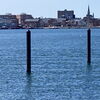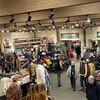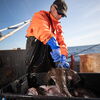New England fisheries feel the effect of warming waters
 File Photo / Lori Valigra
A slide from the June 2015 presentation "Maine's Economy and Climate Change" that shows the rapidly rising maximum temperatures in Southern Maine and its relation to emissions.
File Photo / Lori Valigra
A slide from the June 2015 presentation "Maine's Economy and Climate Change" that shows the rapidly rising maximum temperatures in Southern Maine and its relation to emissions.
After years of contending with overfishing, pollution and increased foreign competition, fishermen along the Northeast Coast are faced with yet another challenge to their way of life — climate change.
The Associated Press spoke to a number of fishermen along the coast about the rapid decline in the fisheries, including David Goethel, a Seabrook, N.H., fisherman who has caught fish in the Gulf of Maine for 30 years.
After spending 12 hours in the gulf in April, Goethel had only caught two cod, a far cry from the 2,000 pounds that he told the AP would be caught in a single day in the 1990s.
The dwindling numbers of fish are also cutting down on the size of the U.S. fishing fleet. The Coast Guard told the AP that the 120,000 vessels reported in 1996 have dropped recently to approximately 75,000.
While warming waters affect nearly all fisheries, the AP reports that it has caused a boom, albeit temporary, in the number of lobsters caught in Maine as the crustaceans move north.
The lobsters are coming from fisheries in New England south of Cape Cod, where the AP reports that numbers of adult lobsters have dropped to approximately 10 million in 2013, a far cry from the 50 million reported in the late 1990s.
But that boom is expected to drop in the coming years, as the Gulf of Maine is warming faster than 99% of the world’s oceans, which will cause lobsters to continue moving north, according to the AP.
But, as in many other industries, there still isn’t a consensus that the drop in the number of fish and lobster along the coast is directly influenced by climate change. Nicholas Crismale, a former lobsterman and president of the Connecticut Commercial Lobstermen's Association, says pesticide runoff is to blame for the drop.
"The warming stuff is a lot of baloney," Crismale told the AP. "All that is is another scientist looking for a grant.”
Read more
Warmer temperatures mean less Maine scallop fishing
Study says Northeast fisheries threatened by climate change
Winter's late arrival impacting Aroostook businesses
Questioning our Changing Oceans' panel discussion at forum
Odds drop for an ‘extremely early’ start to Maine lobster season
Warming waters could bring early lobster price drop
Don’t argue semantics: Prepare for changes in fishing, housing
Gulf of Maine mussel population drastically dropping
Two lobstermen charged with running illegal operation










Comments